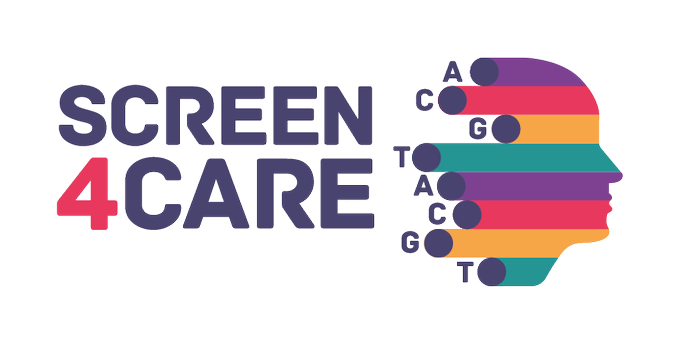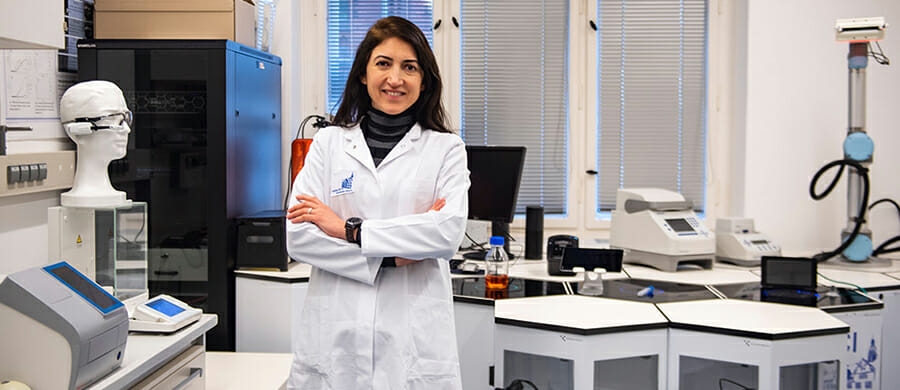UNVERSITY MEDICAL CENTER GÖTTINGEN
Department of Neurology, Institute of Medical Informatics, Department of Pediatrics and Adolescent Medicine (2021-2026)
Elisabeth Nyoungui (Institut für Medizinische Informatik)

DATA & FACTS
Project
Screen4Care – Shortening the path to rare diseases diagnosis by using newborn genetic screening and digital technologies
Scientific contact
PD Dr. Jana Zschüntzsch (PI), Clinic for Neurology; Prof. Dr. Dagmar Krefting (Co-Principal Investigator), Institute for Medical Informatics; Prof Dr. Ekkehard Wilichowski (Co-Principal Investigator), Clinic for Pediatrics and Adolescent Medicine
EU-Funding line
Innovative Medicine Initiative (IMI)
Projektleitung: Prof. Dr.-Ing. Arno Kwade
Projektname: „Li-Ion Pilot Lines Network“ (LiPLANET)
Keywords: Energie, Mobilität, Partner
Screen4Care – Shortening the path to rare diseases diagnosis by using newborn genetic screening and digital technologies
The “Screen4Care” project relies on genetic newborn screening, digital technologies, and high-resolution imaging to diagnose rare diseases faster.
Diseases that affect fewer than one in 2,000 people are considered rare. They are often chronic, have severe courses and carry the risk of permanent organ damage and deterioration for patients. More than 7,000 rare diseases are currently known to medicine. In the EU alone, they affect around 27 to 36 million people. Detecting such diseases is often complicated and involves a large number of misdiagnoses. A novel approach aims to significantly speed up the diagnosis: “Screen4Care” combines genetic newborn screening with imaging techniques and artificial intelligence.
Göttingen scientists* at the University Medical Center Göttingen (UMG) and at the Max Planck Institute for Multidisciplinary Sciences (MPI-NAT) in Göttingen were proactively involved in the conception of the project and are now actively working on the goals and implementation of the innovative research project. A total of 35 universities, institutes, companies, and organizations from 14 European countries are involved. The project started in October 2021 and will run for a period of five years. It is funded with 25 million euros by the Innovative Medicines Initiative, a joint venture of the European Union and the European Federation of Pharmaceutical Industries and Associations. Researchers from the UMG and the MPI-NAT receive 1.27 million euros in research funding.
The neuromuscular specialist Priv-Doz. Jana Zschüntzsch is leading the “digital” work package on the use of algorithms based on machine learning. Patients in the early stages of disease are to be identified more quickly via electronic patient records so that they can be helped promptly on their diagnostic journey. This approach supports symptom-based diagnosis later in life beyond the neonatal period. Prof. Dr. Dagmar Krefting, Director of the Institute of Medical Informatics, UMG, is also contributing her expertise to the digital work package.
The project will also drive the genetic screening of newborn babies using genetic testing and advanced genomic technologies in combination with artificial intelligence. Four sites are involved in Germany. The genetic newborn screening in “Screen4Care” for the Göttingen site is supervised by Prof. Dr. Ekkehard Wilichowski, Deputy Director of the Department of Pediatrics and Adolescent Medicine, UMG.
In addition, Prof. Frauke Alves’ Translational Molecular Imaging research group (MPI-NAT) will focus primarily on the identification of new biomarkers for rare diseases. To do this, the team uses high-resolution multiphoton imaging on muscle tissue. The method allows three-dimensional depiction of the microarchitecture of skeletal muscles responsible for body movements. The data collected will be used to improve digital diagnostic algorithms. The UMG’s Neuromuscular Diseases Research Group led by Priv.-Doz. Jana Zschüntzsch implements another visualization approach. It uses non-invasive multispectral optoacoustic tomography to image pathologically altered muscles. The method uses laser light to generate acoustic signals from tissue that can be converted into 3D images.
In general, Screen4Care aims to establish a digital infrastructure and ecosystem to engage patients, parents of newborns and caregivers as equal decision-makers in the diagnosis process. The ecosystem will provide an open innovation platform, which allows for continuous data collection and information exchange, aiding the development of next-generation diagnostics and enabling physicians, patients and relatives to make informed decisions at an earlier stage.
The ambitious project brings together experts with a wide range of expertise, including genetics, data management, ethics, and cybersecurity as well as the rare disease patient community. Ultimately, the project hopes to have a real impact on patients’ lives by shortening the time taken to diagnose rare diseases. For patients, this will result in a better quality of life thanks to faster access to not only effective treatments, but advice on things like lifestyle adjustments, family planning and genetic counselling – important elements given the genetic nature of many rare diseases.
Authors:
PD Dr. Jana Zschüntzsch, Prof. Frauke Alves
Date:
06.04.2022
This might also interest you …

ProjeCt: BEeSPOKE
The overall objective of BEESPOKE is to increase levels of pollinators and crop pollination at local and landscape scales by providing land managers and policy makers with new expertise, tools and financial knowledge to create more sustainable and resilient agroecosystems. Insect pollination is worth €15 Billion in the EU but wild pollinators are declining…

Project: decades
The chemical industry is currently facing the challenging transformation of replacing classic, chemical manufacturing processes based on petroleum with sustainable, bio-based products, in line with the concept of a circular bioeconomy. Solvents, in particular, play a crucial role in the chemical industry along the entire production chain.
